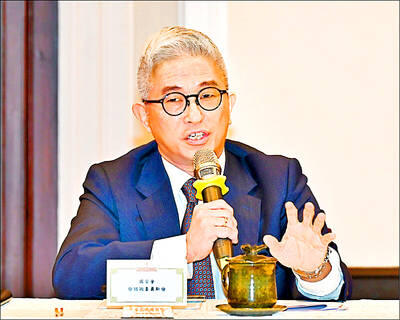The nation's economy is unlikely to be affected by the passage of China's "anti-secession" law, as no timetable for unification is specified in the law's content, market watchers said yesterday.
On the local bourse, the benchmark TAIEX declined 48.72 points to close at 6,155.51 yesterday, while the local currency slid NT$0.012 to close at NT$30.862 against the US dollar.
The law, a draft of which was approved in committee late last year, is aimed to help China assert its legal claim over Taiwan. It allows the use of "non-peaceful means" to prevent Taiwan from seeking formal independence.
Though it may sound threatening, the law does not give a definite schedule for military action by China to push for unification with Taiwan, which means "it does not have specific lethality in its content," said Wu Pei-wei (
Most foreign investors will retain a positive view of Taiwan and other Asian countries, Wu said, adding that only retail investors might be swayed by the law's passage.
As the stock market did not experience major fluctuations, the government did not activate the National Stabilization Fund (
The fund will come into the stock market to maintain order only when non-economic factors disturb market transactions.
Wu Chung-shu (吳中書), a research fellow at Academia Sinica, said the nation's mighty economic momentum trumps political fluctuations when foreign traders assess their investment portfolios in Taiwan's stock market.
"The pressure to be applied by the passage of the law will not be that great, as the issue has been discussed for a long time," he said. "The government's follow-up reaction ... [is] more important."
David Hong (

A car bomb killed a senior Russian general in southern Moscow yesterday morning, the latest high-profile army figure to be blown up in a blast that came just hours after Russian and Ukrainian delegates held separate talks in Miami on a plan to end the war. Kyiv has not commented on the incident, but Russian investigators said they were probing whether the blast was “linked” to “Ukrainian special forces.” The attack was similar to other assassinations of generals and pro-war figures that have either been claimed, or are widely believed to have been orchestrated, by Ukraine. Russian Lieutenant General Fanil Sarvarov, 56, head

SAFETY FIRST: Double the number of police were deployed at the Taipei Marathon, while other cities released plans to bolster public event safety Authorities across Taiwan have stepped up security measures ahead of Christmas and New Year events, following a knife and smoke bomb attack in Taipei on Friday that left four people dead and 11 injured. In a bid to prevent potential copycat incidents, police deployments have been expanded for large gatherings, transport hubs, and other crowded public spaces, according to official statements from police and city authorities. Taipei Mayor Chiang Wan-an (蔣萬安) said the city has “comprehensively raised security readiness” in crowded areas, increased police deployments with armed officers, and intensified patrols during weekends and nighttime hours. For large-scale events, security checkpoints and explosives

‘POLITICAL GAME’: DPP lawmakers said the motion would not meet the legislative threshold needed, and accused the KMT and the TPP of trivializing the Constitution The Legislative Yuan yesterday approved a motion to initiate impeachment proceedings against President William Lai (賴清德), saying he had undermined Taiwan’s constitutional order and democracy. The motion was approved 61-50 by lawmakers from the main opposition Chinese Nationalist Party (KMT) and the smaller Taiwan People’s Party (TPP), who together hold a legislative majority. Under the motion, a roll call vote for impeachment would be held on May 19 next year, after various hearings are held and Lai is given the chance to defend himself. The move came after Lai on Monday last week did not promulgate an amendment passed by the legislature that

PENTAGON ASSESSMENT: A US report said that even as China and Russia deepen their partnership, cooperation is hindered by a ‘mutual distrust’ of each other The Chinese People’s Liberation Army (PLA) as of October had doubled the number of ships and airplanes deployed around Taiwan compared with the previous two years, Vice Minister of National Defense Hsu Szu-chien (徐斯儉) said yesterday, a day after the opposition-controlled legislature voted against reviewing the government’s general budget for next year, including a NT$1.25 trillion (US$39.71 billion) special defense spending bill. The legislature’s vote against the Ministry of National Defense’s spending plans was regrettable, as the budget was designed to respond to the developing Chinese military threat, Hsu said on the sidelines of a legislative meeting on the general budget. Defense